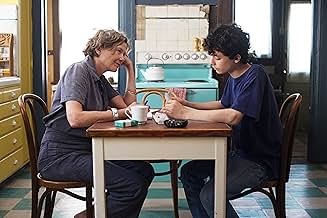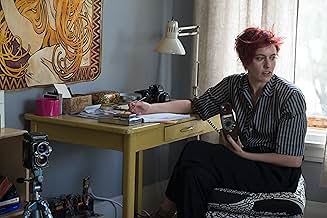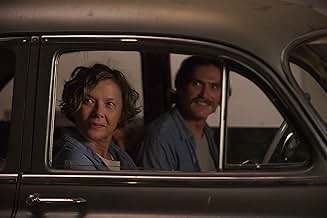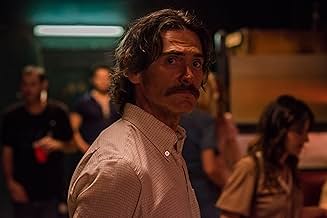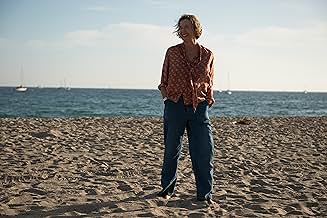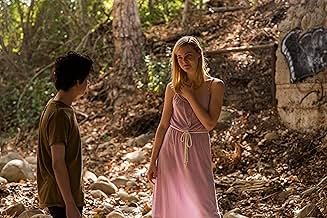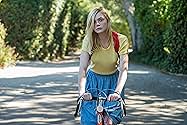VALUTAZIONE IMDb
7,3/10
51.454
LA TUA VALUTAZIONE
Segui la storia di un adolescente, sua madre e altre due donne che lo aiutano a crescere tra l'amore e la libertà della California meridionale del 1979.Segui la storia di un adolescente, sua madre e altre due donne che lo aiutano a crescere tra l'amore e la libertà della California meridionale del 1979.Segui la storia di un adolescente, sua madre e altre due donne che lo aiutano a crescere tra l'amore e la libertà della California meridionale del 1979.
- Regia
- Sceneggiatura
- Star
- Candidato a 1 Oscar
- 15 vittorie e 82 candidature totali
Vitaly Andrew LeBeau
- Young Jamie Fields
- (as Vitaly A. Lebeau)
Recensioni in evidenza
The status of "too personal" could be its basic virtue. and its sin. because it represents a chronicle. about "80 decade, about family life in large sense, about sexual education and motherhood. and, sure, about freedom. in same measure, it is a film with precise target. remembering independent films, near to every day details too much, it is the film who could be an experience, usuful in profound sense, or just waste of time. but, out of that too easy definitions, it is an admirable work. for script, performances - the kind of film in which each actor seems be the only wise choice for his character - but, first, for Annette Bening who does a magnificent job as middle age mother, in war against her past, insecure about future, without courage to become herself, appentice of her son, discovering the essence of life next her friends. a great film. really !
Just like the central character in this film, I was born in 1964. Just like him, I was 15 in 1979. My mother was only two years older than his mother. So, you'd think I could relate to this film. But I couldn't, really.
Maybe that is because I didn't grow up in a bohemian single parent household in Santa Barbara. Life for 15 year old Jamie was different than it was from me. I had two parents, but I didn't have a skateboard.
Yes, I can remember Jimmy Carter being president. But I didn't see his impressive and remarkably modern 'Crisis of Confidence'-speech, which is an important feature in one of the scenes of this film. There's only one thing which caused somewhat nostalgic emotions: making mix tapes. Yes, I did that too.
'20th Century Women', which is essentially about a mother raising a son, has nice scenes. I really liked the explanation about punk rock music to the 55 year old mother: she complains about the lack of beauty, but exactly that is the strength of it. There are many such scenes, with small but meaningful events, telling a lot about how life was in the seventies.
But the story itself didn't captivate me. Jamie's mother thinks she can't raise Jamie on her own, so she involves his best friend (a girl) and a photographer who rents a room in the house (also a girl). They teach him lots of things about sex, music, seducing women, and life in general. All characters are in a way in search of there own destiny. So, a lot of soul searching is going on. Anyway, the film contains one of the best one-liners I've heard in years: 'Wondering if you're happy is a great shortcut to just being depressed'.
Maybe that is because I didn't grow up in a bohemian single parent household in Santa Barbara. Life for 15 year old Jamie was different than it was from me. I had two parents, but I didn't have a skateboard.
Yes, I can remember Jimmy Carter being president. But I didn't see his impressive and remarkably modern 'Crisis of Confidence'-speech, which is an important feature in one of the scenes of this film. There's only one thing which caused somewhat nostalgic emotions: making mix tapes. Yes, I did that too.
'20th Century Women', which is essentially about a mother raising a son, has nice scenes. I really liked the explanation about punk rock music to the 55 year old mother: she complains about the lack of beauty, but exactly that is the strength of it. There are many such scenes, with small but meaningful events, telling a lot about how life was in the seventies.
But the story itself didn't captivate me. Jamie's mother thinks she can't raise Jamie on her own, so she involves his best friend (a girl) and a photographer who rents a room in the house (also a girl). They teach him lots of things about sex, music, seducing women, and life in general. All characters are in a way in search of there own destiny. So, a lot of soul searching is going on. Anyway, the film contains one of the best one-liners I've heard in years: 'Wondering if you're happy is a great shortcut to just being depressed'.
20th Century Women isn't about giving us some epic look at a group of friends or a family, but it is about the passage of time with people who are warm and caring and in a genuine way. Mike Mills isn't a saccharine filmmaker, but he also doesn't shy away from sentiment - I always have to point out this is separate from sentimentality - and the feeling that I came away with from the comedy 20th Century Women is this warmth from all of the characters, and this feeling that I know these people, whether I did or didn't (and I actually did in the sense that, at times, the mother and son were me and my mom for a short period of my teenage years, so there's an authenticity just there to me).
There's so much empathy for everyone here that it adds to the authenticity of the emotions, even for Greta Gerwig's Abbie who is, in essence, another 'Greta Gerwig' character like I've seen, or think I've seen, in other movies (her quirky wisdom seems akin to last year's Mistress America at least). While she is my least favorite person in this movie, she's given a history and many moments, surrounding one of those terrible things that happens to people and there's not much to be done about it, or could've, it's out of the hands of anything *to* be done. There's so much work done on the characters here by Mills, getting us to like them despite all of their flaws or those moments where they don't act with logic or sense, that it doesn't matter that there isn't too much of a story. This is the story of these characters in a short span of time while also, as if looking on from some other, ethereal plane, about what this time meant in the context of what came before 1979, and what was to come.
Among the actors here, Lucas Jade Zumann is the breakout star as the 15 year old Jamie, but I was so taken with Benning and Fanning as the 50-ish, "she was in the depression" as she's described mother and the 2 years older than Jamie but that matters so much pleutonic friend respectively. I wonder if the film would've worked with any other actors in the roles, but really I can't imagine anyone else. Every time Bening's on screen she gives Dorothea this feeling of 'well... I guess this is happening now, what do I do about it, I'm not sure', and while she can get angry or concerned she's never one to go too over the top - this is the anti-Fences in that regard of being about a kid scarred by a parent - she does care about what happens to her son, with the "inciting incident" in screen writing terms being him almost dying from doing one of those dumb-s*** things teenagers do on a dare. It's a unique and subtle performance, filled with a sense of... questioning, uncertainty, which is harder to pull off than it looks.
Fanning, meanwhile, is also having to underplay, which is good to see. This is an impressive year for her between this, Live by Night (which she was the best part of) and the Neon Demon, and she's different in all of them. I want to say I like the work she does here the most even as (or because) it's the least likable one among the bunch (and keep in mind she's a born-again Christian in the South in LbN). Mills's writing provides Fanning a great deal to make Julie come alive, but I found her not saying things, the way she shows Jamie how to hold a cigarette, when she is saying little, and then when she is backed into doing something that she should want to do but doesn't go for - going past being 'just friends' with Jamie in the last third - how she responds is devastating. It's like, 'no, don't act this way', as opposed to simply looking at her as a "B"-word, which is how a hackier writer could've gone with it.
Oh, and I must reiterate this is a comedy, and it's funny as hell. There's certainly some dramatic stretches, but Mills mines a lot of humor out of generational splits - Bening's face as she hears early Black Flag, and then trying to "move" to it with Billy Crudup, is one of the funniest things this year - and it's a tricky balance that Mills finds between making the feminism (yes, actual literature and quotes spoken in voice-over from essays) serious AND humorous. We don't doubt that the feminism of the characters is pure, but there's also that question that's posed: how much is really appropriate, or can be legitimately understood, by 15 year old who barely knows who he is in this world?
And on top of this Mills is having fun and some daring as a filmmaker, using psychedelic colors to show cars driving at times, and going not for the slow-motion but fast-motion speed, but not for comedy - the aesthetic point matches up with what the movie's about: life moves too fast, and we have to try and keep up with it best as we can and grow with things and become better people as everything moves too quickly. If it's ultimately too episodic to be anything really great or up to be there with the very best this year, I'd still tell anyone who likes smart character independent(ish) movies centered on teenagers and adults to see it immediately; it has a good place alongside The Squid and the Whale and, to a less taboo extent, Diary of a Teenage Girl.
There's so much empathy for everyone here that it adds to the authenticity of the emotions, even for Greta Gerwig's Abbie who is, in essence, another 'Greta Gerwig' character like I've seen, or think I've seen, in other movies (her quirky wisdom seems akin to last year's Mistress America at least). While she is my least favorite person in this movie, she's given a history and many moments, surrounding one of those terrible things that happens to people and there's not much to be done about it, or could've, it's out of the hands of anything *to* be done. There's so much work done on the characters here by Mills, getting us to like them despite all of their flaws or those moments where they don't act with logic or sense, that it doesn't matter that there isn't too much of a story. This is the story of these characters in a short span of time while also, as if looking on from some other, ethereal plane, about what this time meant in the context of what came before 1979, and what was to come.
Among the actors here, Lucas Jade Zumann is the breakout star as the 15 year old Jamie, but I was so taken with Benning and Fanning as the 50-ish, "she was in the depression" as she's described mother and the 2 years older than Jamie but that matters so much pleutonic friend respectively. I wonder if the film would've worked with any other actors in the roles, but really I can't imagine anyone else. Every time Bening's on screen she gives Dorothea this feeling of 'well... I guess this is happening now, what do I do about it, I'm not sure', and while she can get angry or concerned she's never one to go too over the top - this is the anti-Fences in that regard of being about a kid scarred by a parent - she does care about what happens to her son, with the "inciting incident" in screen writing terms being him almost dying from doing one of those dumb-s*** things teenagers do on a dare. It's a unique and subtle performance, filled with a sense of... questioning, uncertainty, which is harder to pull off than it looks.
Fanning, meanwhile, is also having to underplay, which is good to see. This is an impressive year for her between this, Live by Night (which she was the best part of) and the Neon Demon, and she's different in all of them. I want to say I like the work she does here the most even as (or because) it's the least likable one among the bunch (and keep in mind she's a born-again Christian in the South in LbN). Mills's writing provides Fanning a great deal to make Julie come alive, but I found her not saying things, the way she shows Jamie how to hold a cigarette, when she is saying little, and then when she is backed into doing something that she should want to do but doesn't go for - going past being 'just friends' with Jamie in the last third - how she responds is devastating. It's like, 'no, don't act this way', as opposed to simply looking at her as a "B"-word, which is how a hackier writer could've gone with it.
Oh, and I must reiterate this is a comedy, and it's funny as hell. There's certainly some dramatic stretches, but Mills mines a lot of humor out of generational splits - Bening's face as she hears early Black Flag, and then trying to "move" to it with Billy Crudup, is one of the funniest things this year - and it's a tricky balance that Mills finds between making the feminism (yes, actual literature and quotes spoken in voice-over from essays) serious AND humorous. We don't doubt that the feminism of the characters is pure, but there's also that question that's posed: how much is really appropriate, or can be legitimately understood, by 15 year old who barely knows who he is in this world?
And on top of this Mills is having fun and some daring as a filmmaker, using psychedelic colors to show cars driving at times, and going not for the slow-motion but fast-motion speed, but not for comedy - the aesthetic point matches up with what the movie's about: life moves too fast, and we have to try and keep up with it best as we can and grow with things and become better people as everything moves too quickly. If it's ultimately too episodic to be anything really great or up to be there with the very best this year, I'd still tell anyone who likes smart character independent(ish) movies centered on teenagers and adults to see it immediately; it has a good place alongside The Squid and the Whale and, to a less taboo extent, Diary of a Teenage Girl.
Greetings again from the darkness. Writer/director Mike Mills has found a niche, and a form of therapy, by exploring and exposing his life in a most public manner
on the silver screen. Beginners (2010) brought us the story of his father's (an Oscar winner for Christopher Plummer) late life pronouncement of homosexuality. This time, Mr. Mills turns his lens and his pen towards his mother, and he seems to understand her much better in retrospect than in the summer of 1979 when the film is set.
This can be viewed as the story of three women, masked as a coming-of-age story for a teenage boy. Annette Bening stars as Dorothea, a chain-smoking single mother in her mid-50's who seems to have surrendered to her own sadness and loneliness, while simultaneously trying to make sense of a changing world. One of her tenants is Abbie (Greta Gerwig), a photographer and NYC punk scene drop-out, who is now battling cervical cancer. The third female is the seemingly always present Julie (Elle Fanning), a sexually promiscuous and borderline depressive 18 year old who values the platonic friendship she has with Dorothea's 15 year old son Jamie (Lucas Jade Zuman).
Factor in another tenant in the form of laid-back handyman and former hippie William (Billy Crudup), and we have a makeshift family in a communal setting that seems almost normal for 1979 Santa Barbara. Dorothea enlists the other two women to show Jamie their lives – the intent being to influence his growth in ways an older mother can't. Of course, Jamie is at the age where exploring life isn't necessarily best served by tagging along on a trip to the gynecologist with Abbie or having no-touch sleepovers with Julie.
Ms. Bening finds her groove as the story progresses and we feel her struggling to connect to each of the characters. When William plays a Black Flag song, her reaction is priceless: "They know they're not good, right?" She doesn't mean it as a put down, but rather her attempt to understand why her son is drawn to this. An even more emotionally naked moment occurs when Jamie is reading a passage from "The Feminine Mystique" to his mother. It's a passage that captures what he thinks of her, as well as what she thinks of herself a mostly invisible woman finding it difficult to be a parent while also maintaining a self.
Mills is not one to be nostalgic or glorify the past. His brilliant writing includes lines like "Wondering if you are happy is a great short cut to being depressed." The movie can be slow moving at times, but it's the best I've seen in awhile at expressing what makes us tick. The film is what Running with Scissors should have been. Real people are sometimes interesting, sometimes boring, and sometimes annoying. Each of the characters here are all of the above (just like you and me).
This can be viewed as the story of three women, masked as a coming-of-age story for a teenage boy. Annette Bening stars as Dorothea, a chain-smoking single mother in her mid-50's who seems to have surrendered to her own sadness and loneliness, while simultaneously trying to make sense of a changing world. One of her tenants is Abbie (Greta Gerwig), a photographer and NYC punk scene drop-out, who is now battling cervical cancer. The third female is the seemingly always present Julie (Elle Fanning), a sexually promiscuous and borderline depressive 18 year old who values the platonic friendship she has with Dorothea's 15 year old son Jamie (Lucas Jade Zuman).
Factor in another tenant in the form of laid-back handyman and former hippie William (Billy Crudup), and we have a makeshift family in a communal setting that seems almost normal for 1979 Santa Barbara. Dorothea enlists the other two women to show Jamie their lives – the intent being to influence his growth in ways an older mother can't. Of course, Jamie is at the age where exploring life isn't necessarily best served by tagging along on a trip to the gynecologist with Abbie or having no-touch sleepovers with Julie.
Ms. Bening finds her groove as the story progresses and we feel her struggling to connect to each of the characters. When William plays a Black Flag song, her reaction is priceless: "They know they're not good, right?" She doesn't mean it as a put down, but rather her attempt to understand why her son is drawn to this. An even more emotionally naked moment occurs when Jamie is reading a passage from "The Feminine Mystique" to his mother. It's a passage that captures what he thinks of her, as well as what she thinks of herself a mostly invisible woman finding it difficult to be a parent while also maintaining a self.
Mills is not one to be nostalgic or glorify the past. His brilliant writing includes lines like "Wondering if you are happy is a great short cut to being depressed." The movie can be slow moving at times, but it's the best I've seen in awhile at expressing what makes us tick. The film is what Running with Scissors should have been. Real people are sometimes interesting, sometimes boring, and sometimes annoying. Each of the characters here are all of the above (just like you and me).
This is a very strong film, unless you only like fast-paced action films; I'm going to go out on a limb and say you'll probably like this movie.
As is the norm with A24... it's a good film.
I don't really have much to complain about. I belied in the world of the film, I believed the characters were real, etc-- the world and logic of the film was well established. There were a few tropes of the genre, but some strong writing and direction makes one look past this without really thinking about it. I actually cared about the story and wanted to see how things played out.
The story is a bit disjointed, but I think that works to the film's benefit due to the type of storytelling it's going for, which overall is very effective.
I'd recommend this film to pretty much everyone that likes good movies.
8 out of 10
As is the norm with A24... it's a good film.
I don't really have much to complain about. I belied in the world of the film, I believed the characters were real, etc-- the world and logic of the film was well established. There were a few tropes of the genre, but some strong writing and direction makes one look past this without really thinking about it. I actually cared about the story and wanted to see how things played out.
The story is a bit disjointed, but I think that works to the film's benefit due to the type of storytelling it's going for, which overall is very effective.
I'd recommend this film to pretty much everyone that likes good movies.
8 out of 10
Lo sapevi?
- QuizDuring rehearsals, the cast was encouraged to bring in music they believed their characters listened to. Then, to encourage familiarity among the cast, there would be a dance party where the only rule was that everyone had to dance and it didn't matter what the song was.
- BlooperDorothea is variously depicted discussing her stock portfolio with her son Jamie, quoting NYSE share prices in decimals, doing this in 1979. However, the switch to decimal from fractional stock prices in the U.S. did not occur until the year 2000.
- ConnessioniFeatured in WatchMojo: Top 10 Movies of 2016 Already Getting Oscar Buzz (2016)
- Colonne sonoreDon't Worry About the Government
Written by David Byrne
Performed by Talking Heads
Courtesy of Sire Records
By arrangement with Warner Music Group Film & TV Licensing
I più visti
Accedi per valutare e creare un elenco di titoli salvati per ottenere consigli personalizzati
- How long is 20th Century Women?Powered by Alexa
Dettagli
- Data di uscita
- Paese di origine
- Siti ufficiali
- Lingua
- Celebre anche come
- Mujeres del siglo XX
- Luoghi delle riprese
- East Beach, Santa Barbara, California, Stati Uniti(Santa Barbara, CA)
- Aziende produttrici
- Vedi altri crediti dell’azienda su IMDbPro
Botteghino
- Budget
- 7.000.000 USD (previsto)
- Lordo Stati Uniti e Canada
- 5.664.764 USD
- Fine settimana di apertura Stati Uniti e Canada
- 111.200 USD
- 1 gen 2017
- Lordo in tutto il mondo
- 7.214.806 USD
- Tempo di esecuzione
- 1h 59min(119 min)
- Colore
- Mix di suoni
- Proporzioni
- 2.00 : 1
Contribuisci a questa pagina
Suggerisci una modifica o aggiungi i contenuti mancanti







